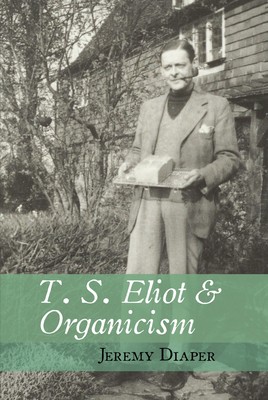
- We will send in 10–14 business days.
- Author: Jeremy Diaper
- Publisher: Clemson University Press
- ISBN-10: 1942954603
- ISBN-13: 9781942954606
- Format: 15.5 x 22.6 x 2.3 cm, kieti viršeliai
- Language: English
- SAVE -10% with code: EXTRA
Reviews
Description
T. S. Eliot and Organicism provides the first comprehensive account of Eliot's preoccupation with agrarianism, organicism and the environment. Jeremy Diaper elucidates and contextualizes several facets of Eliot's organic thinking, ranging from composting and soil fertility, to regionalism, nutrition and culinary skills. Through detailed examination of Eliot's engagement with organic issues, this book offers environmental readings of Eliot's poetry and plays and demonstrates that agrarian concerns emerge as a notable theme in his literary output - from his earliest notebook of poems known as Inventions of the March Hare to Murder in the Cathedral. This book also analyzes Eliot's prose to illuminate his engagement with the key environmental debates which were taking place during the 1930s-50s.
Diaper offers a thorough analysis of Eliot's social criticism and explores his perturbation regarding the decline of agriculture in After Strange Gods, The Idea of a Christian Society and Notes Towards the Definition of Culture. T. S. Eliot and Organicism breaks new ground by demonstrating that a thorough understanding of Eliot's engagement with environmentalism is vital to our interpretation of both his poetry and prose. It establishes that one of the twentieth century's most eminent literary figures should be remembered for his important role in the emergence of the organic husbandry movement and for his wide-ranging comments on a variety of environmental and organic issues.EXTRA 10 % discount with code: EXTRA
The promotion ends in 22d.23:26:30
The discount code is valid when purchasing from 10 €. Discounts do not stack.
- Author: Jeremy Diaper
- Publisher: Clemson University Press
- ISBN-10: 1942954603
- ISBN-13: 9781942954606
- Format: 15.5 x 22.6 x 2.3 cm, kieti viršeliai
- Language: English English
T. S. Eliot and Organicism provides the first comprehensive account of Eliot's preoccupation with agrarianism, organicism and the environment. Jeremy Diaper elucidates and contextualizes several facets of Eliot's organic thinking, ranging from composting and soil fertility, to regionalism, nutrition and culinary skills. Through detailed examination of Eliot's engagement with organic issues, this book offers environmental readings of Eliot's poetry and plays and demonstrates that agrarian concerns emerge as a notable theme in his literary output - from his earliest notebook of poems known as Inventions of the March Hare to Murder in the Cathedral. This book also analyzes Eliot's prose to illuminate his engagement with the key environmental debates which were taking place during the 1930s-50s.
Diaper offers a thorough analysis of Eliot's social criticism and explores his perturbation regarding the decline of agriculture in After Strange Gods, The Idea of a Christian Society and Notes Towards the Definition of Culture. T. S. Eliot and Organicism breaks new ground by demonstrating that a thorough understanding of Eliot's engagement with environmentalism is vital to our interpretation of both his poetry and prose. It establishes that one of the twentieth century's most eminent literary figures should be remembered for his important role in the emergence of the organic husbandry movement and for his wide-ranging comments on a variety of environmental and organic issues.

Reviews